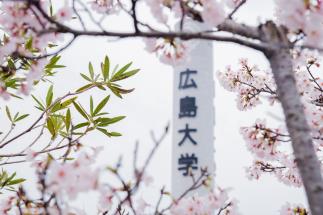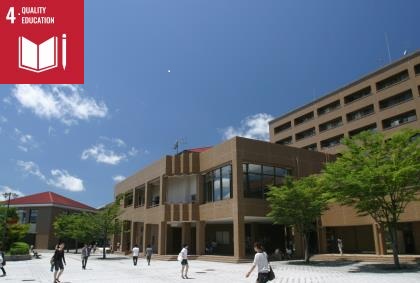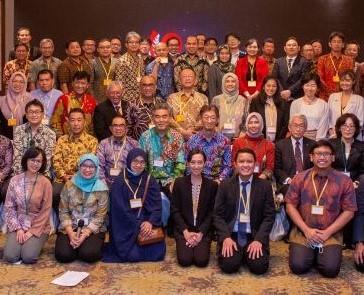- Hiroshima University Teacher Training Course Guide(328.62 KB)
- Hiroshima University Academic Advisors(152.66 KB)
University Overview
Characteristics and History
In 1949, Hiroshima University was founded with our hope of reborn and peace after an atomic bomb which completely destroyed Hiroshima City. And now, setting a long-term vision as “realizing a diversified, free and peaceful global society”, we aim to contribute for achieving the Sustainable Development Goals. We have a reputation as a leading university among education universities in Western Japan, as well as being prominent among all the universities of Japan for its large number of students.
Hiroshima University consists of 12 undergraduates and 5 graduate schools, performing the education and research activities to meet various demands in our society under globalization, informatization, lifelong learning, and international cooperation. Aside from the undergraduate and graduate programs, Hiroshima University offers a variety of unique research centers including the Research Institute for Higher Education, the Center for Peace, the Morito Institute of Global Higher Education, and the Research Institute for Radiation Biology and Medicine.
Separated from the bustling city and surrounded by abundance of nature, the vast Higashi-Hiroshima Campus provides the perfect study environment.


International Exchange
・Number of International Students: AY 2025:1,919 AY 2024: 1,831 AY 2023: 1,726
・Number of Teacher Training Students: AY 2025: 11 AY 2024: 11 AY 2023: 12
Outline and the Characteristics of the Course for Teacher Training Students
Characteristics of the Program
The Division of Educational Sciences in the Graduate School of Humanities and Social Sciences aims to contribute for educational research, practices, and human resources development in the levels from early childhood to higher education towards the construction of a sustainable and peaceful world. The Educational Design for Teacher Educators Program and the Educational Studies Program are prestigious institutes in the area of education in Japan and the world.
We have nurtured a great number of leading teachers, teacher educators and educational researchers on early childhood education, primary and secondary education, special needs education, and higher education. The International Education Development Program has widely contributed for the human resources development in Asian, African, and Latin American countries.
We have accepted a total number of 147 teacher training students from different countries since this program started. We will educate those who will create new educational values and knowledge to realize sustainable development and peace for human beings and societies!
Number of Students to be Accepted: 30
Period of scholarship: October 2026 - March 2028
Requirement for program completion
Japanese language education:
A six-month intensive Japanese language course at the elementary level is offered in the Morito Institute of Global Higher Education (about 30 hours of instruction per week). As long as main supervisor accepts, they could be admitted directly into academic training (if necessary, with the intermediate or advanced Japanese Language/Japanese Affairs course) for one and a half year without the abovementioned intensive language course.
Specialized training:
We provide for individual academic tutoring by main supervisor and conduct in-depth research on respective training themes during one-year academic training, 10 hours or more of study time per week is required for research, lectures, and practicum. At the end of the course, teacher training students are required to submit their final report for their program
completion.
Practical training, Fieldwork, and Exchanges:
Extra-curricular activities and cultural programs with Japanese students will be organized by university such as school visits, exchange programs, tours to historical places in Hiroshima.

Follow-up for Graduates
Hiroshima University has 23 overseas bases in 14 countries and regions And, Overseas Alumni Associations have been organized in 10 countries and regions for networking those who have graduated or completed their studies including teacher training students We will soon make a new platform for the collaboration of overseas bases, alumni associations, companies, and related organizations As the first model, the Hiroshima University Alumni Association Indonesia Chapter
was established in 2022.
Even after completing their studies, teacher training students keep in touch with their main supervisors and actively devote themselves with high expertise to the educational development in their home countries.
*Overseas Bases
China (Beijing, Shanghai, Chongqing, Changchun, Qinhuangdao), Taiwan, Mongolia, Indonesia (Jakarta, Bandung), Vietnam (Ho Chi Minh, Thai Nguyen), Myanmar, Cambodia, Russia, Germany (Munster, Saarland), Lithuania, Mexico (Mexico City, Guanajuato), Brazil, Kenya, Egypt (Cairo, Galala)
*Overseas Alumni Associations
China (Beijing, Shanghai, Dalian), Taiwan, South Korea, Indonesia (Jakarta, Bandung, Surabaya, Makassar), Vietnam, Myanmar, Cambodia, Malaysia, Nepal, Brazil

Accommodations
During the half year of the Japanese language education period, the International House (University Dorm for International
Students) is available During the specialized training period, there are some options of off campus housing, such as apartments managed by Hiroshima University Coop, public housings, and private apartments Applications for the accommodation will be accepted by online form or e mail before arriving in Japan (around July).
In order to cover living expenses and set up costs until the time of the first scholarship payment, it is suggested that students bring a minimum of ¥100, 000 with them to Japan.
On Campus Housing for International Students during the Japanese language education period
[International House (Single Room)]
○Number of accommodations: 60 rooms
○Accommodation fee: Rent 5,900 yen/month, Common facility charge 2,500 yen/month,
Laundry room charge around 2,000 yen/month
○Facility and equipment: Study desk, chair, bed, wardrobe, refrigerator, and unit bath
○Commuting time:
20 min walk/10 min bicycle to School of Education,
10 min walk/5 min bicycle to the Blidg. of International Education Development Program
*There is no fee to pay in advance After moving in, open an account at Japan Post Bank and
pay the rent fees and utilities by bank transfer.
※ https://www.hiroshimau.ac.jp/en/centers/welfare_facilities/international_house
Off-campus Housing by Hiroshia University Coop
Apartment (Single Room) recommended by the University Coop
○Number of accommodations: 24 facilities
○Accommodation fee: Rent 20,000 to 35,000 yen (common facility charges included)
<Costs required when moving in>
・Rent for the month you move in: Calculated on a daily basis.
(Payment exempted for move in months after the 20th)
・Gratuity fee: 1 month's rent.
(will not be refunded when moving out)
・Deposit: 20,000 yen
(When moving out, the balance will be refunded after paying compensation if necessary)
・Indoor cleaning fee: 20,000 yen
・Insurance fee: 8,290 yen (one year insurance)
・Coop fee: 2,000 yen (full refund upon completion)
○Facility and equipment: Lighting equipment, gas stove, refrigerator, washing machine, bed, and microwave included
○Commuting time: 10-20 minutes by bicycle to School of Education or the Blidg. of International Education Development Program
*Pay the coop fee and insurance fee in cash at the move in briefing session and pay other initial cost by convenience store payment
*Pay the monthly payment by direct debit through a Hiroshima Bank account
*Various expenses such as brokerage fees, administrative fees, guarantee fees, management fees, contract renewal fees, etc are not required
※https://hiroshima.yestart.univcoop.net/en/global
Contact
Student Support Office for the fields of Education, Graduate School of Humanities and Social Sciences, Hiroshima University
Address: 1-1-1, Kagamiyama, Higashi- Hiroshima City, Hiroshima
739-8524, Japan
Phone : +81-82-424-6720
Fax : +81-82-424-7108
Email kyoiku-in@office.hiroshima-u.ac. jp
Website:
University: https://www.hiroshima u.ac.jp/en
Graduate School: https://www.hiroshima u.ac.jp/en/gshs



 Home
Home